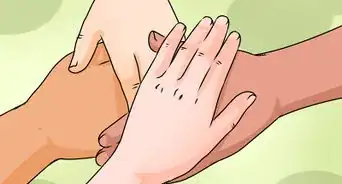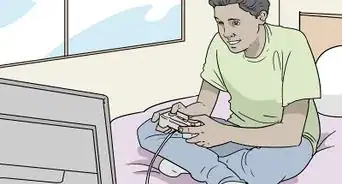X
wikiHow is a “wiki,” similar to Wikipedia, which means that many of our articles are co-written by multiple authors. To create this article, 76 people, some anonymous, worked to edit and improve it over time.
This article has been viewed 134,211 times.
Learn more...
In an ideal world, everyone would be free to be themselves at all times. However, because society frequently unfairly judges LGBTQ folks, you may feel compelled to pretend to be straight in order to be safe or accepted in your community. If your family or community don't accept LGBTQ identities, presenting as straight may be safer. This article will demonstrate how to do so.
Steps
Part 1
Part 1 of 3:
Understanding Yourself
-
1Ask yourself why you feel the need to pretend to be straight. Understanding your reasons is important, so you can sort out your feelings and also recognize when things change. You might pretend to be straight for one (or many) of the following reasons:
- Your family is homophobic
- You could be kicked out of your home if you're LGBTQ
- Religious confusion
- Internalized homophobia
-
2Tell yourself that you have a new hidden identity for now. Your straight identity is only a cover for you; it's not a better version of you. Your goal is to pass for straight. Your mission will eventually come to an end.
Advertisement
Part 2
Part 2 of 3:
'Appearing' Heterosexual
-
1Hang up pictures of 'opposite' gender people. Teens frequently decorate their walls and lockers with images of people they find attractive, so use images of traditionally 'opposite' gender people and celebrities to enhance your cover.
-
2Make up a crush on someone who is unattainable (optional). Direct your fake straight attraction toward a 'hot' celebrity. This is a low-risk method, as many teenagers (regardless of sexual orientation) have crushes on musical artists or actors.
- If you fake a celebrity crush, you can go to extra mile to convince people you're straight and say things like, "his blue eyes make me swoon" or "I love her confidence and poise."
-
3Present 'according' to your gender if it would be risky not to do so. Adjust your appearance as part of your cover. Adhering to gender roles will help when you're undercover. Consider it like a costume. Draw the line on anything itchy or uncomfortable, because that's just no fun. If you're a expected to dress in a feminine way, try wearing dresses, shorts, skirts, jewelry, or feminine colors. If you're expected to dress in a masculine manner, wear jeans, t-shirts, and masculine colors.
Advertisement
Part 3
Part 3 of 3:
Staying Healthy
-
1Be wary of groups that may coerce, bully, or otherwise abuse you into playing it straight. Instead, find friends and people you can truly trust with your identity. A truly supportive friend group offers unconditional support and love. If they're "supporting" you but only if you pretend you're straight, that's not true support and may be toxic.
- A truly supportive community doesn't offer conditional support. If they're "supporting" you but only if you choose to act like you aren't gay, that isn't true support and it may be toxic.
-
2Keep an eye on your mental health and take care of yourself. Staying closeted involves increased mental health risks,so you need to take extra good care of yourself. Exercise daily, eat healthy foods, and get plenty of sleep at night. [1] [2]
-
3Find a place where you can be completely yourself. Find a place where you can simply be yourself without fear of being discovered or mistreated. This can be at a friend's house, grandparent's home, or your even your bedroom. [3]
-
4Consider whether the loneliness of pretending to be interested in a "straight" activity you despise is worth it. LGBTQ men may feel pressure to enjoy sports, and queer women might feel pressure to enjoy fashion and makeup, but it's okay to enjoy or not enjoy those things, regardless of gender.
-
5Confide in people you can trust. Perhaps you can talk to a friend or family member, or maybe you can go to an online community for LGBTQ youth. This can be a source of unconditional love and support.
Advertisement
Warnings
- Hating and hiding who you are may increase your risk of suicide.⧼thumbs_response⧽
- If you are suicidal, in crisis, or just having a hard time, you can reach out to the Trevor Project to speak to a trained counselor for free.⧼thumbs_response⧽
Advertisement
References
About This Article
Advertisement

















-Step-14-Version-2.webp)
-Step-16.webp)

















































